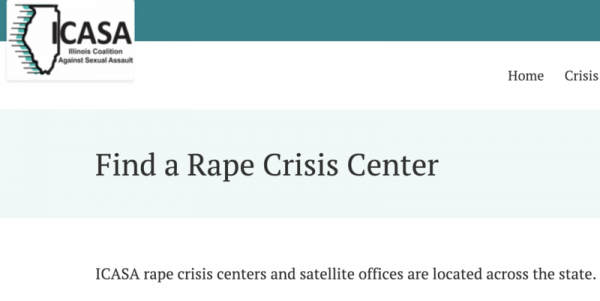State’s Sexual Assault Crisis Centers Struggling During Gov’t Shutdown

Illinois’ crisis centers for sexual violence survivors are starting to feel the effects of the partial government shutdown—now in its fourth week. Funding for services will soon stop coming in. Illinois Coalition Against Sexual Assault Website / Illinois Coalition Against Sexual Assault
Illinois’ crisis centers for sexual violence survivors are starting to feel the effects of the partial government shutdown—now in its fourth week. Funding for services will soon stop coming in.
The Justice Department has given organizations until January 18, when it will stop processing funding requests.
The Justice Department is tasked with managing money for these organizations. It is one of nine departments shut down by the dispute over funding for President Donald Trump’s border wall. Until now, staff was able to continue processing refunds during the four weeks of the shutdown.
Carrie Ward, executive director of the Illinois Coalition Against Sexual Assault -- a network of 30 rape crisis centers across the state -- said the group hopes to minimize the impact. The centers mobilized to get their refund requests processed by the deadline. Now, Ward said, all they can do is wait for a resolution to the shutdown and try to keep the centers open.
"But there’s only so much money available, and because these dollars are so specifically for counselors and advocates, my greatest concern would be that eventually there would have to be fewer counselors and advocates that are providing the services," she said.
Ward said federal money makes up about 60 percent of the organization’s overall funding, which also includes some state dollars. She said victims should know services are still available 24/7 and efforts will focus on keeping centers open.
"Our effort is we will absolutely have the 24-hour response, the 24-hour crisis line and 24-hour response to hospitals and law-enforcement departments," she said.
"But what we don’t want to see is the impact on victims for having to wait longer for the services that they need.”
Links
- New Funding Helps Schools; Resources For Sexual Assault Survivors; Hurricanes; Wild Animal Safety
- Illinois Issues: More Nurses To Help Sexual Assault Survivors
- Illinois Senate Tackles Sexual Assault In Youth Sports
- Sexual Assault Survivor and Advocate Shares Story and Advice
- IL Coalition Against Sexual Assault Commends #MeToo
